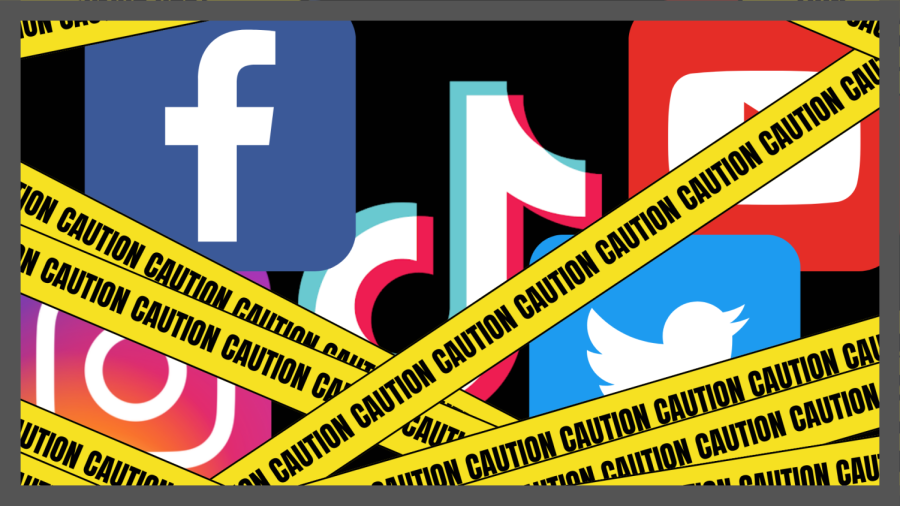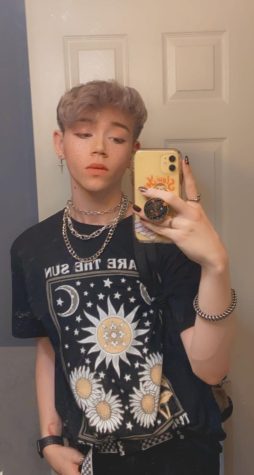Internet Censorship: Virtual Voices Silenced
In today’s age of technology and online social interaction, many online influencers and political speakers face heavy censorship.
November 10, 2022
Welcome to the 21st century! In today’s modern world of cybersecurity, information sharing, and social media powerhouses, it is no shock that the public has garnered a wild interest in social media influencers. Whether you idolize them for their engaging content and entertaining personalities or despise them for their vain and selfish use of social media platforms for personal gain, engaging with influencer-produced content is simply unavoidable at this point. With this comes a slew of suspicions regarding reliability and bias in what content creators are relaying to their audiences. This has caused many social media platforms to set new standards and guidelines for what content can and can not include. When creators violate these guidelines, they are punished with warnings, restricted access, and in some cases, complete disabling of their accounts.
An example of social media platforms attempting to prevent the spread of misinformation would be Facebook introducing a fact-checking program. This program rates pieces of shared content on a scale including labels like false, altered, partially false, missing context, satire, and true. The process of doing so involves consulting sources/ public data and authenticating images and videos. When labeling a piece of content as false, Facebook is giving the creator a bad reputation, which would imply that fewer people would engage with that material.
A similar idea comes in the form of what many influencers call “ Shadowbanning”. This is what many know as the suppression of one’s content and intentional misdirection of such from one’s intended and respective audience. In other words, content creators who are shadowbanned face punishments for their reliability or community guidelines violations in the form of their content not reaching their followers as intended. A well-known example of this would be Gabbie Hana. Hana rose to fame in the early 2010s on the short-form video app, Vine. When that platform faced a decline, she moved her content to Youtube where she reached over six million subscribers. Her content consisted of storytime-style videos as well as daily lifestyle and fitness content in the form of Vlogs. In early 2020, Hana faced backlash over comments she had made years prior on Twitter as well as alleged protection of the sexual abuser of her former friend. While she denied the allegations and provided context for her old comments, she did not take responsibility for the situation as a whole, causing her to be the target of heavy scrutiny. This reflected poorly on her Youtube channel where she was allegedly shadowbanned. Hana claimed that her content was not being shared with her followers. For example, when she would post a video, those with push notifications enabled were meant to receive an alert saying she posted. Reportedly, many of her followers did not receive alerts about new uploads. She also claimed her likes and comments were being reduced. Given the circumstances surrounding the attention she had recently been getting, many believed that a large number of people stopped engaging with her content out of disdain for her past actions.
Tiktok, a popular short-form video-sharing app, is widely known for its strict community guidelines and its zero tolerance for violations. This has impacted Tiktok creators in the form of swift and sometimes, unfair banning and deleting of videos. Many videos are taken down for “Minor Safety”, which would make sense considering that this app is intended for children. However, many political content creators report that while their content is factually correct and minimally biased, their content is taken down for hate speech or sometimes, unspecified reasons. Suppression of this content may also come in the form of removing the audio from a post making it impossible to engage with what the creator is saying. Many users suspect that Tiktok removes opinionated content to prevent heavy disputes over the app. What Tiktok officials may not realize is that this suppresses content creators who, while not using the app for its intended use, are not violating actual community guidelines. The restrictions and guidelines for social media platforms such as Tiktok, Instagram, Twitter, and Facebook prohibit support of terrorism, offering of sexual services, Hate Speech, Bullying, Abuse, selling of drugs or firearms, promoting or showcasing self-harm, or nudity/ sexually explicit content. This does not prohibit the spread of politically opinionated content. Thus, where does social media stand on the issue of free speech? The first amendment to the constitution protects free speech from punishment from the government and the government alone, meaning social media platforms can reduce or suppress your content for any reason they see fit. These platforms are privately owned businesses that have the power to fully control what is circulating throughout their servers. When content creators are shadowbanned, banned, or suppressed in any way, they are facing the punishments they signed up for when clicking that little “ Agree” button when scrolling through the terms and conditions of their platforms. While it does seem like an abusive use of power, these platforms must address all concerns and have no personal attachment to content that could get them in hot water.


